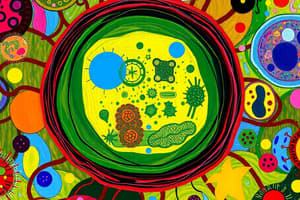Podcast
Questions and Answers
Which branch of biology focuses on the study of plants?
Which branch of biology focuses on the study of plants?
- Microbiology
- Zoology
- Molecular Biology
- Botany (correct)
What is the primary focus of genetics in biology?
What is the primary focus of genetics in biology?
- Study of evolution and species descent
- Study of cell physiological properties
- Study of heredity and variation (correct)
- Study of energy transfer in ecosystems
Which of the following processes describes how green plants convert light energy?
Which of the following processes describes how green plants convert light energy?
- Cellular Respiration
- Photosynthesis (correct)
- DNA Replication
- Protein Synthesis
What term refers to the ability of an organism to maintain internal stability?
What term refers to the ability of an organism to maintain internal stability?
Which level of biological organization is defined as groups of similar cells performing a specific function?
Which level of biological organization is defined as groups of similar cells performing a specific function?
What is the basic unit of life according to cell theory?
What is the basic unit of life according to cell theory?
What term describes the process by which species undergo genetic changes over time?
What term describes the process by which species undergo genetic changes over time?
What does the term 'DNA' refer to in biological terms?
What does the term 'DNA' refer to in biological terms?
Flashcards are hidden until you start studying
Study Notes
Overview of Biology
- Biology is the scientific study of life and living organisms.
- It encompasses various fields, including ecology, genetics, evolution, and more.
Major Branches of Biology
- Zoology: Study of animals.
- Botany: Study of plants.
- Microbiology: Study of microorganisms.
- Cell Biology: Study of cells and their physiological properties.
- Molecular Biology: Study of biological processes at the molecular level.
- Ecology: Study of interactions between organisms and their environment.
- Genetics: Study of heredity and variation in organisms.
- Evolutionary Biology: Study of the origin and descent of species.
Key Concepts
- Cell Theory: All living organisms are composed of cells, and cells are the basic unit of life.
- Homeostasis: The ability of an organism to maintain internal stability.
- Energy Transfer: Organisms require energy to sustain life processes; this often comes from sunlight or food.
- Evolution: The process by which species undergo genetic changes over time due to natural selection.
Levels of Biological Organization
- Molecules: Chemical building blocks of life (e.g., DNA, proteins).
- Cells: Basic unit of life.
- Tissues: Groups of similar cells performing a specific function.
- Organs: Structures composed of different tissues working together.
- Organ Systems: Groups of organs that perform complex functions.
- Organisms: Individual living entities.
- Populations: Groups of the same species living in a specific area.
- Communities: Interactions of different populations in a given area.
- Ecosystems: Interactions between communities and their environment.
- Biosphere: The global sum of all ecosystems; the zone of life on Earth.
Important Biological Processes
- Photosynthesis: Process by which green plants convert light energy into chemical energy (glucose).
- Cellular Respiration: Process of converting glucose and oxygen into energy (ATP), releasing carbon dioxide and water.
- Protein Synthesis: The process by which cells construct proteins based on genetic instructions.
Key Terms
- DNA: The molecule that carries genetic information.
- Genes: Units of heredity, segments of DNA that code for proteins.
- Chromosomes: Structures made of DNA and proteins that contain genes.
- Ecosystem Services: Benefits provided by ecosystems to humans, such as clean water, pollination, and climate regulation.
Current Trends in Biology
- Genomic technology: Advances in genetic sequencing and biotechnology.
- Conservation biology: Focus on preserving biodiversity and ecosystems.
- Synthetic biology: Engineering new biological parts and systems for useful purposes.
Biology: The Study of Life
- Biology encompasses the scientific study of living organisms and their interactions.
- It is a diverse field with multiple branches, each focusing on specific aspects of life.
Branches of Biology
- Zoology: Centers on the study of animal life, encompassing anatomy, behavior, and evolution.
- Botany: Focuses on the study of plants, including their structure, classification, and ecological roles.
- Microbiology: Investigates the world of microorganisms, such as bacteria, viruses, and fungi.
- Cell Biology: Delves into the structure, function, and behavior of cells, the fundamental unit of life.
- Molecular Biology: Explores biological processes at the molecular level, including DNA, RNA, and proteins.
- Ecology: Studies the interactions between organisms and their environment, focusing on populations, communities, and ecosystems.
- Genetics: Investigates heredity and variation in organisms, exploring the mechanisms of gene transmission and expression.
- Evolutionary Biology: Examines the origins and diversification of life, elucidating the processes that drive changes in species over time.
Fundamental Concepts
- Cell Theory: Posits that all living organisms are composed of cells, and that cells are the basic unit of life. This theory unifies the study of life by recognizing the fundamental building block of all living things.
- Homeostasis: Refers to the ability of organisms to maintain internal stability despite external changes. This crucial mechanism ensures optimal conditions for vital processes within the organism.
- Energy Transfer: Living organisms require a constant supply of energy for growth, reproduction, and other life functions. This energy is obtained through either sunlight (photosynthesis) or the consumption of other organisms.
- Evolution: Describes the process by which species undergo genetic changes over time due to natural selection. This continuous process drives the adaptation of organisms to their environment and the diversification of life forms.
Levels of Biological Organization
- Molecules: The smallest unit of life, forming the building blocks of all living organisms. Examples include DNA, RNA, and proteins.
- Cells: The fundamental unit of life, capable of carrying out all essential life processes.
- Tissues: Groups of similar cells that work together to perform a specific function.
- Organs: Structures composed of different tissues working together to carry out a more complex function.
- Organ Systems: Groups of organs that cooperate to perform vital functions within the organism (e.g., digestive system, nervous system).
- Organisms: Individual living entities capable of independent existence.
- Populations: Groups of the same species living in a particular area.
- Communities: Interactions between different populations within a given area, forming a complex web of relationships.
- Ecosystems: Interactions between communities and their environment, encompassing the flow of energy and matter within a specific region.
- Biosphere: The global sum of all ecosystems, representing the zone of life on Earth, encompassing all living matter and their surrounding environment.
Important Biological Processes
- Photosynthesis: The process by which green plants convert light energy into chemical energy (glucose), fueling their growth and providing a basis for the food chain.
- Cellular Respiration: Allows organisms to convert glucose and oxygen into energy (ATP), releasing carbon dioxide and water as byproducts.
- Protein Synthesis: The fundamental process by which cells construct proteins based on genetic instructions. This process is essential for building and maintaining all cellular structures and functions.
Key Terms
- DNA: The molecule that carries genetic information, acting as a blueprint for life.
- Genes: Units of heredity, segments of DNA that code for specific proteins.
- Chromosomes: Structures composed of DNA and proteins that contain multiple genes, serving as the organized carriers of genetic information.
- Ecosystem services: Benefits that humans derive from functioning ecosystems, including clean air and water, pollination, food production, and climate regulation.
Current Trends in Biology
- Genomic Technology: Advances in genetic sequencing and biotechnology enable researchers to analyze and manipulate genes, offering vast potential for understanding and treating diseases.
- Conservation Biology: Focuses on preserving biodiversity and ecosystems, recognizing their vital roles in maintaining a healthy planet.
- Synthetic Biology: Aims to engineer new biological parts and systems with beneficial applications, such as producing biofuels or designing new medicines.
Studying That Suits You
Use AI to generate personalized quizzes and flashcards to suit your learning preferences.




